International Day of the Indigenous People
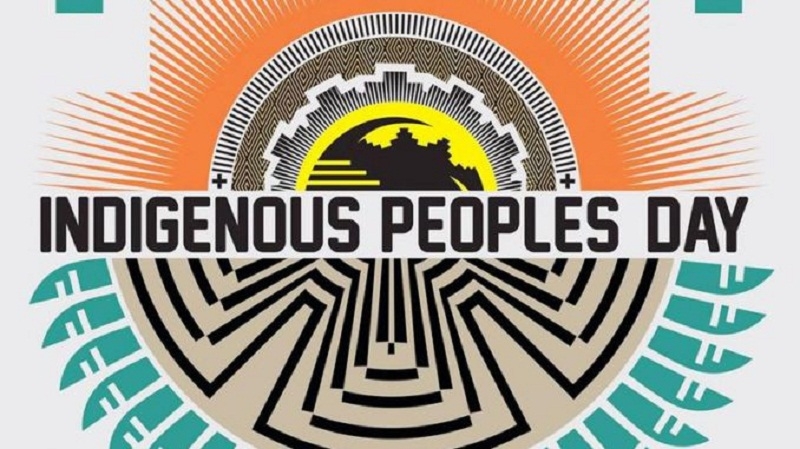
August 9th is celebrated worldwide as the International Day of the Indigenous People. One must ask then - Who are the Indigenous People? When was this day created? What was the need for such a day? What it means for India? Here I try to find answers to above questions.
Discovery of New Lands: This story of ‘Indigenous’ or the ‘Native’ peoples begins in the year of 1453, with the fall of Constantinople to the Ottomans. Soon after that the land bridge that joined Europe to India was closed. The Europeans then needed to find a way to cross the ocean and reach India. Many expeditions left the European shores in search of a route to India.
Vasco Da Gama sailed to the East, to circumvent the continent of Africa, cross the Arabian Sea and reach West coast of India. He reached India in 1498. By 1600 the British, French, Swedish, Portuguese, Dutch and Spanish ‘East India Companies’ were formed. With their help the British and Portuguese established their rule in ‘Nearer India’ that is today’s Pakistan, India, Bangladesh and Myanmar. While the Dutch, French and the Spanish established their rule in the ‘Farther India’, that is in Indonesia, Cambodia, Vietnam, Philippines etc.
Another explorer Christopher Columbus sailed to the West to find the sea route to India, which was then believed to be at the other end of the Atlantic Ocean. In this sea fare of 1492, Columbus accidently discovered a new continent that is now called America. Soon after the discovery of the new continent Portuguese, Spanish, French, English and the Dutch rushed there; to conquer it, to colonize it and to settle there. The Spanish settled in Central America, Portuguese in Southern America, British in Eastern USA and Canada and the French in Canada.
Almost 300 later, in 1770, the British explorer James Cook discovered the continent of Australia. When it was found to be habitable, the British fleets arrived in 1788 to colonize it. Over the next hundred years, many colonies were setup along the shores of Australia.
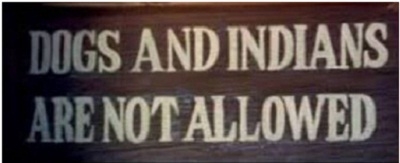
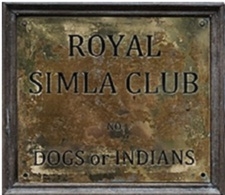
Signs like above from the Royal Club in Simla and the Watson Hotel in Mumbai were the normal thing during the British Raj in India. It is another story that when the 'Native' Jamshetji Tata was driven out of the Watson Hotel for being ‘Indian’, he built the Asia’s first luxurious hotel – The Taj Mahal Palace in Mumbai. Or there is another story of a young advocate named Mohandas who was thrown out of the first class carriage for being ‘a native Indian’.
What happened to the Natives of Australia?: When British started expanding into the interiors, they came into direct conflicts with the Aboriginals. The Aboriginals fought using guerrilla tactics for a long time. Only when the British began the use of modern weapons, they could overwhelm the aboriginals. Europeans viewed the Aboriginal peoples as savages.
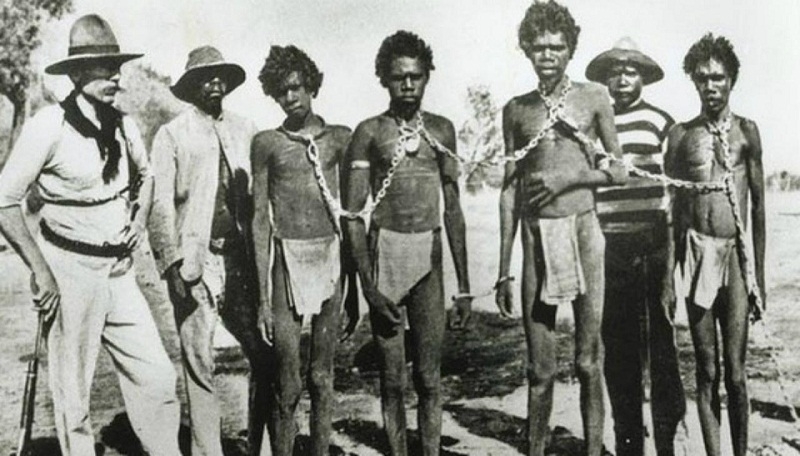
By 1880s a large number of Aboriginal people were killed in the armed conflicts. The contact with the Europeans brought diseases to the land of Australia. Their death rate was so alarming that the British thought that all of the Aboriginals might become extinct. Many of these native tribes that survived were subjected to the civilizing missions and still others became source for labors.
What happened to the Natives of America?: After the advent of the Europeans on the shores, the natives lost their land, their riches, their liberty, their culture, their languages and their identity. Many natives were captured and subjected to slavery, they were separated by a caste system and their children were sent to be civilized in segregated schools.
The Sun Dance, a Native religious tradition was banned in the USA and Canada. This ban was lifted by USA in 1978.
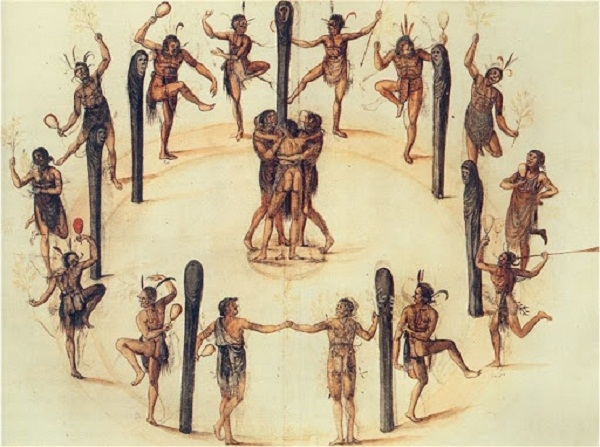
To quote a CNN news piece, a new study finds – “When Europeans arrived in the Americas, they caused so much death and disease that it changed the global climate. European settlers killed 56 million indigenous people over about 100 years in South, Central and North America, causing large swaths of farmland to be abandoned and reforested, researchers at University College London, or UCL, estimate. The increase in trees and vegetation across an area the size of France resulted in a massive decrease in carbon dioxide (CO2) in the atmosphere, according to the study. Carbon levels changed enough to cool the Earth by 1610, researchers found.”
Human Rights for the Natives: It is evident that the Natives of all the European colonies enjoyed no human rights. Natives everywhere fought wars against Europeans to gain independence. Some of the colonies were able to break free of the European rule.
What is the picture in the less fortunate countries, where the Natives did not win the war of independence? USA became an independent country in 1776, yet the Govt of USA gave the ‘Native Americans’ full citizenship only in 1924. The Native Americans were not considered as the citizens of their own land! The first elections were held in the USA in 1788. But it was not before 1984 that every Native got the right to vote. Same was the case in Australia, where first elections were held in 1901. But it was not until 1984 that Aboriginals across all states of Australia got the right to vote.
What triggered the change in 1984?: On 9th August 1982, the first meeting, of the UN Working Group on Indigenous Populations was held. This committee worked on Promotion and Protection of Human Rights decided that it was high time to extend the Human Rights to the Native populations. Until 1982, the Natives were still not held as equal in stature to the White People. After 1982 America and Australia had to give the right to vote to its Native populations.
Wherever the Natives lost the wars of independence they suffered great economic, social and cultural losses. The death of Native languages, traditions, landscapes was beyond repair. Appalled by this situation, UN realized the urgent need to save the Natives and their cultures. Few years later 9th August was selected as the day to celebrate the Native cultures all over the World.
The Picture in India: India gained independence from the colonial rule in 1947. There and then, EVERY Indian was equal in front of the law. EVERY person born in India became a citizen of India. EVERY Indian got the right to vote, right from the first elections that were held in 1951. The Indian constitution has ensured that EVERY person is enabled to vote. For example, in 2019 one booth was set up 70 km inside the dense forest of Gir sanctuary for just ONE voter.
India and Indians have celebrated diversity since ages. India has provided refuge to people prosecuted elsewhere. Be those Jews, Zoroastrians, Christians or Tibetan Buddhist. It will become evident that it is natural for Indians to provide protection to all peoples living in cities, villages, forests, mountains or islands.
As an example here is the story of the hunter - gatherer tribes of Andaman. As long as the Indian rule extended over the seas, these tribes lived without any interference or fear from Indians of the mainland. After the arrival of British in the islands in 1858, within next 50 years, the island's 10 strong tribes numbering in thousands were reduced to 4 tribes with populations of less than hundred each. After the departure of the White Man in 1947, these tribes could go back to their own way of living.
Display of Natives from different continents as missing link between Apes and Humans in 'Human Zoos' was normal in Europe and America. The Andamanese people were also 'exhibited' by the British in this manner. Two such Andamanese youths died because of exposure to cold.
What 9th Aug Means to India?: Any Indian who is not a White, European, Christian is a Native. When British came to India, all Indians were termed as ‘Natives’. Even today, EVERY Indian is a ‘Native’. For India, 9th August is the day of celebration of the Indian native culture. This is very special as it was on this land of India that the Natives had won over the Colonial forces. It is a time to rejoice and celebrate the fact that our culture is alive. It is time to celebrate that ALL people of India – be them rural or urban, southern or northern, eastern or western, forest dweller or mountain dweller, mainland dweller or island dweller, all fought to win the war against the Foreign rule. It is a day when we should look back and offer Shraddhanjali to the generations of fighters who gave their time, money and life in this long war of Independence. It is because of their sacrifices that people in every corner of India are living free. It is because we were victorious that every Indian can live his/her tradition, religion, culture and language.
